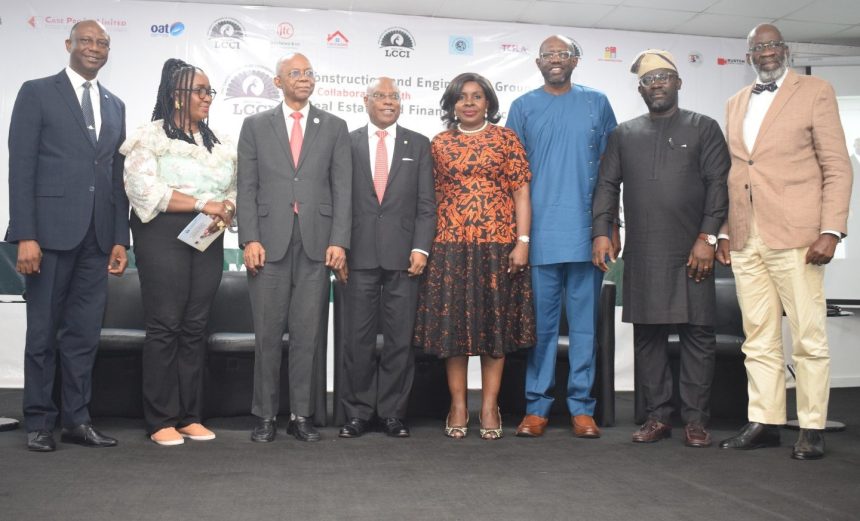In light of Nigeria’s growing infrastructure deficit and housing challenges, industry leaders are renewing calls for the establishment of a specialized construction bank to promote long-term financing for projects.
This plea was articulated during a seminar themed “The Built Environment: Economic Impact, Sustainability, and Future Development,” organised by the Construction and Engineering Sectoral Group in collaboration with the Real Estate and Financial Services Sectoral Groups, under the auspices of the Lagos Chamber of Commerce and Industry (LCCI).
The seminar gathered experts from the construction, real estate, finance, and urban development sectors, who discussed the critical intersections of infrastructure development, sustainability, and economic growth.

Joseph Ajanlekoko, President of the Commonwealth Association of Surveying and Land Economy (CASLE), emphasised the urgent need for a Nigerian-owned Construction Development Bank.
He argued that such an institution would provide vital services and complement the offerings of existing banks and financial institutions, ultimately benefiting the economy and its citizens.
READ ALSO: Ukraine Signs Memorandum with World Bank to Enhance Housing Market
“The lack of long-term financing for large-scale infrastructure projects has hindered progress in the construction sector,” Ajanlekoko stated. “Local banks typically focus on short-term loans, leading to numerous abandoned projects and an increase in building collapses.”
Highlighting Nigeria’s poor infrastructure rankings, he noted that the country placed 24th out of 54 African nations in the Africa Infrastructure Development Index (AIDI) in 2020, indicating a slow response to critical infrastructure needs.
Ajanlekoko stressed the importance of long-term solutions and financial innovations to tackle these pressing challenges.
Despite predictions of Nigeria’s real estate sector reaching $2.26 trillion by 2024 and $3.02 trillion by 2028, the nation continues to grapple with a housing deficit of 28 million units, particularly in urban areas. Rapid urbanisation and a population exceeding 200 million exacerbate the crisis, with demand for residential and commercial properties outstripping supply.
“This situation presents a unique opportunity for developers and investors,” Ajanlekoko noted, pointing to increasing demand in urban cities like Lagos, Abuja, and Port Harcourt.
READ ALSO: Construction Company Successfully Dualises 220km Keffi-Akwanga-Lafia-Makurdi Road
He also underscored the significance of sustainability in Nigeria’s developmental trajectory, advocating for the adoption of sustainable building practices and technological advancements to reduce construction costs and enhance project durability.
“Sustainability should be at the core of our efforts to rebuild the nation’s infrastructure,” Ajanlekoko asserted, adding that such practices would improve efficiency, resilience, and environmental responsibility within the built environment.
The former president of the Nigerian Institute of Quantity Surveyors further highlighted the necessity of skilled labour in the construction industry.
He called for concerted efforts to develop vocational training programmes and enhance education in technical fields, partnering with both the private sector and government agencies.
LCCI President Mr. Gabriel Idahosa echoed the need to elevate industry standards and address systemic challenges.
He stressed that inadequate financing often forces developers to compromise on material quality and construction standards.
Idahosa also called for stronger enforcement of existing regulations, such as the national building code, to ensure the safety and sustainability of buildings. “While the regulatory framework is in place, the critical issue lies in enforcement, with corruption and lack of transparency among inspectors contributing to substandard practices,” he explained.
Adesoji Adeniji, Chairman of the LCCI Construction & Engineering Sectoral Group, concluded that the future of the built environment depends on innovative thinking and a commitment to long-term sustainability in policy and practice. He emphasised the importance of incorporating innovation and technology to balance profitability with ecological stewardship, asserting that sustainable building practices and renewable energy use are essential for reducing costs and enhancing project efficiencies.
As industry leaders advocate for the establishment of a specialised construction bank, the hope remains that these collective efforts will pave the way for a more sustainable and prosperous future for Nigeria’s housing sector.



